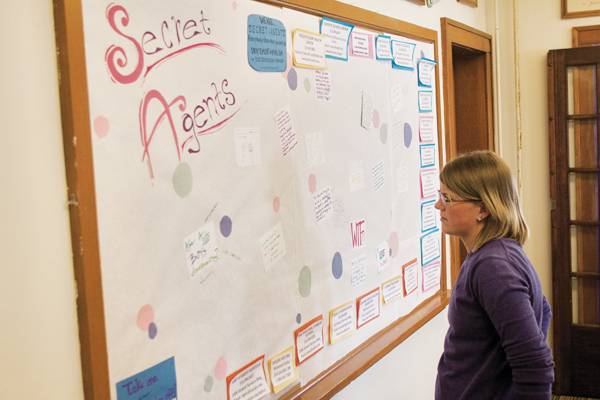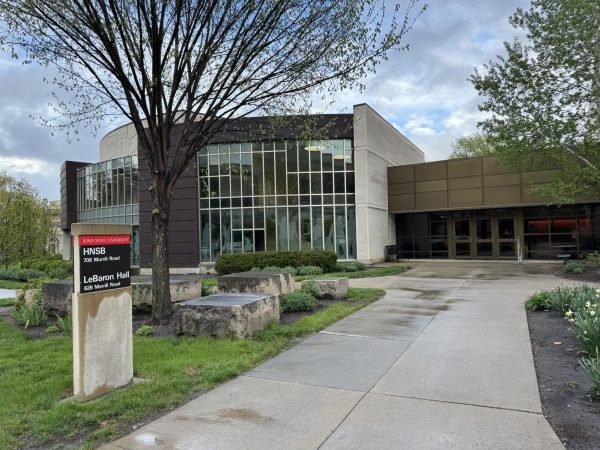ISU Students share secrets

Christine Peterson, senior in child, adult and family services reads secrets on the Secret Agent board, Thursday, in the Sloss House. Peterson, an intern at the Margaret Sloss Women’s Center, said they average two to three secrets every week. Photo: Karuna Ang/Iowa State Daily
March 2, 2010
Everyone has a secret.
The Sloss House is giving students and faculty the chance to share their secrets anonymously on a board they like to call “Secret Agents.”
“One afternoon I was having lunch with my daughter and talking about Post Secret,” said Penny Rice, director of Sloss House. “She had a postcard that had been on the Web site on Father’s Day and she told me I should do something like that here.”
Rice’s daughter, Liz Mettille, senior in interdisciplinary studies and sociology, reflected on the project’s beginning in fall 2008, and the role she played.
“My dad died in Iraq in Feb. 2007. We had a non-traditional relationship and there was a lot left unsaid,” Mettille said. “I sent in that secret, along with several other secrets, because I felt like I was in a very unique situation that others couldn’t relate to.
“He passed away when I was almost 21, while others who have lost parents in the war have been very young, so they may not remember their mother or father.”
Mettille said there are no words to explain what it’s like to lose a parent, but the act of submitting the secret gave her a chance to “belt it out to the world” and to let others know they weren’t alone.
“Anyone you talk to won’t be able to explain it.”
So Mettille started Secret Agents, a play on words, she said, since everyone is an agent of secrets and the Women’s Center is often the agent of secrets.
“Some make you want to cry; some make you want to laugh your ass off,” Mettille said. “They gave you that feeling that other people know your situation. It helps to know that they stopped for a second during their day to read about my problem.”
The concept of “mattering,” connecting and fitting in with others, is a key concept in the project, Rice said.
“I was downstairs in a meeting with about 10 people one day. A young man came in and went directly to the board,” Rice said. “He grabbed a card, wrote his secret and put it up. The card said he had been sexually assaulted.
“If I had not seen him walk in and write it, I would have automatically assumed it was a female. What we used to do was to take a piece of yarn and connect the secret to [community resources] surrounding the board.”
Each card is a snapshot of the things that are going on in students’ lives. Many describe the loss of a parent — “The last thing I told my dad before he died was that I hated him” — or problems with sex — “I cheated on my boyfriend and now I think I might be pregnant … with another man’s baby. What have I done?”
“There’s this assumption that college is the ‘best time of your life,’” Rice said. “After reading some of these, I hope not.”
But, Rice said, some of the secrets surprise her with their empowerment and hope. Secrets such as “I am pretty” and “I want to do little things every day to make this world my paradise” have shown Rice the complexity of students.
“This program connects students,” Rice said. “It shares what they can’t talk about with others and peeks into their heads and hearts a little bit.”
Rice said it would be great if academic advisers or faculty, people who work with students, would come in and read through them.
“One of the core values of student affairs is service, to challenge and support their thinking,” Rice said. “We try to let them know their strengths, growth areas — and their identity and the exploration of their identity.”
Mettille encourages anyone and everyone to go to the Sloss House, take a look at the secrets on the board, and maybe even submit one of their own.
“Keeping a secret is like pulling teeth,” Mettille said. “It kills you to not be able to tell anyone, whether it’s your secret or someone else’s. The individual [whom the secret is about] is not likely to see it anyway or know where it came from.”
Anonymously share what you won’t tell.
Drop ‘em off or mail ‘em:
205 Sloss House
Ames, IA 50011
















